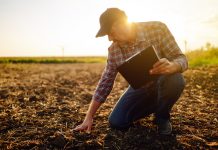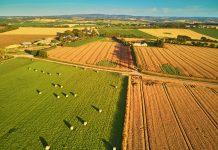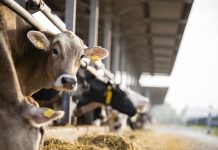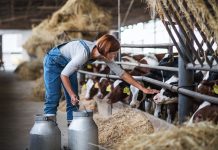Commissioner for Agriculture Janusz Wojciechowski outlines Europe’s Organic Action Plan in his speech presenting it as one of the major initiatives in the Commission Work Programme for 2021
This action plan is key for the achievement of the Farm to Fork and Biodiversity Strategies and their targets, which were adopted in May 2020 within the context of the European Green Deal.
You may recall that both the Farm to Fork and Biodiversity Strategies contain the objective of achieving 25% of the EU’s agricultural land under organic farming by 2030 (and a significant increase in organic aquaculture).
There were good reasons for adopting a target on organic farming:
- Organic farming has positive environmental, climate, biodiversity and animal welfare effects.
- Any increase in organic farming will also have a multiplier effect: It will have an immediate positive impact on other Farm to Fork and Biodiversity Strategy targets (reductions in the use of the fertilisers, reductions in the use of pesticides, reductions in the sales of antimicrobials).
The 25% target is also ambitious:
- Currently 8.5% of agricultural land is under organic farming. If we would extrapolate current trends, we would only achieve between 15% and 18% of all agricultural land under organic farming by 2030. The target is thus up to 10% higher than what a business as usual approach would achieve.
- At the same time, we see that Member States are at vastly different starting points. In some of them, organic farming accounts for more than 25% of all agricultural land, while in others it accounts for 0.5%.
The whole purpose of this action plan is to help achieve that target of 25% of agricultural land under organic farming by 2030. Of course, this action plan must be seen in a wider context of assets we can build on:
- There is the new organic regulation, which will enter into application next year, providing the legal stability and predictability that is so important for farmers considering converting from conventional agriculture to organic farming.
- There is the availability of substantial financial incentives, under the current and the new Common Agricultural Policy, but also under Horizon Europe and under the agricultural promotion policy, which will support the implementation of this action plan.
- There is the high level of public trust in organics and the growing level of public recognition of the EU organic logo.
Let me now turn to the plan itself and highlight some its main features. A smart approach has been developed, based on an analysis of the sector and on proposed actions that have all been widely endorsed by stakeholders and the broader public during the public stakeholder consultation.
Focus on citizen demand and consumption first
The action plan is truly comprehensive. It focuses on production and consumption and sustainability. It also covers the complete value chain since some of the actions concern farmers and other actions concern processors, wholesalers, retailers, restaurants, canteens, schools.
But, at the same time, the action plan also takes an approach that is first of all demand-driven, consumption-driven. The logic is that farmers will not convert unless they see a demand for their products. And the focus is on demand and consumption in both the public sectors and the private sectors.
That is why the first axis of the action plan is called “stimulating demand, ensuring consumer trust” and contains measures such as:
- Information measures.
- Agricultural promotion campaigns and awards.
- Greater uptake of organics in public canteens and Green Public Procurement.
- Organic products in school schemes.
- Preventing food fraud, improving traceability.
- Reinforcing the role of retailers, wholesalers, catering services, restaurants and other businesses.
Mobilising the Common Agricultural Policy
The action plan should not be seen in isolation. It should be seen in conjunction with, and it can build on, a number of assets. One of those assets, as already mentioned, is the Common Agricultural Policy, which will be mobilised fully to support the implementation of the plan, and in particular its second axis, which is called “stimulating conversion, reinforcing the entire value chain”.
The CAP will provide financial support, but also other types of support. As regards financial support, the relevant CAP instruments include the eco-schemes and rural development environmental management commitments, which include organic farming. The eco-schemes will be backed by a budget of €38-58 billion for the period 2023-2027, depending on the outcome of the on-going negotiations. CAP support will also include technical assistance and the exchange of best practices and innovations in organics. Farm advisory services on specific topics will be strengthened, notably as part of Agricultural Knowledge and Innovation System (AKIS), to promote relevant knowledge exchange.
Focus on better use of natural resources Organic farming is currently the only system that has been recognised by a robust certification method. It leads by example on the path to more sustainable agricultural practices, a better use of renewable resources, higher animal welfare standards, and higher incomes for farmers. This does not mean, however, that the sustainability of organic farming cannot be further improve. This is why this action plan includes a strong focus on a better use of natural resources and on reductions in the use of plastics, water and energy.
Specific relevant actions include the following:
- Taking steps, to set up, in cooperation with stakeholders, a pilot network of carbon-neutral/climate positive organic holdings, to share best practices.
- A proposed mission in the area of Soil Health and Food could contribute to the pilot network in particular through the deployment of living labs and lighthouses and other activities supporting carbon farming.
- Earmarking funding under Horizon Europe for research and innovation projects on alternative approaches to contentious inputs, paying particular attention to copper and other substances as assessed by the European Food Safety Authority.
- Preparing guidelines and criteria under which the use of sustainable bio-based materials that are easily degradable in natural conditions is beneficial and on how to improve the reuse and collection of recyclable plastics. The guidelines will be applicable to all types of agriculture, organic farming leading the way.
- Promoting the more efficient and sustainable use of water, the increased use of renewable energy and clean transport, and the reduction of nutrient release, in all types of agriculture, with organic farming leading the way, and with the involvement of the Member States through their CAP Strategic Plans, as well as with the new Strategic Guidelines for aquaculture and EMFAF.
Focus on research & innovation
Organic farming is already knowledge-intensive. And there is a clear need to enhance even further our knowledge so that organic farming can become even more sustainable and also more productive.
That is why this plan includes a strong focus on research and innovation. The proposal is to dedicate at least 30% of the budget for research and innovation actions in the field of agriculture, forestry and rural areas to topics specific to or relevant for the organic sector.
Specific relevant actions include:
- Support research and innovation under Horizon Europe on alternative sources of organic vitamins and other substances that might turn out to be necessary, and on alternative sources of protein keeping in mind their technical and economic feasibility.
- Support research and innovation on alternative sources of nutrients, breeding and animal welfare in aquaculture.
- Earmark funding under Horizon Europe to support the preservation and use of genetic resources, pre-breeding and breeding activities, and the availability of organic seeds, and to contribute to the development of organic heterogeneous plant reproductive material and plant varieties suitable for organic production.
- Earmark funding under Horizon Europe for research and innovation projects on alternative approaches to contentious inputs, paying particular attention to copper and other substances as assessed by the European Food Safety Authority.
Novelties
I would also like to mention a number of novelties:
- We will stimulate the sector’s visibility through awards recognising excellence in the organic food chain in the EU.
- We will have an EU organic day.
- And we will work around new concepts like Biodistricts.
We will encourage Member States to support their development and implementation because they have proven successful in integrating organic farming and other local activities to enhance tourist appeal also in areas that are off the mainstream tourist track.
A Biodistrict is a geographical area where farmers, the public, tourist operators, associations and public authorities enter into an agreement for the sustainable management of local resources, based on organic principles and practices. The aim is to maximise the economic and sociocultural potential of the territory.
I would just like to end by making two important points. First, I am confident we will achieve the target. The action plan is performance-oriented, with concrete planning and implementation on the one hand, and a strong focus on monitoring and delivery on the other hand:
- It is clearly structured into three axes and 23 actions.
- It is focused on national planning and implementation, in accordance with national circumstances, via the organic component of the CAP national strategic plans and the development of national organic action plans (covering measures beyond the CAP).
- It is focused on delivery via a comprehensive monitoring system (progress reports, mid-term review).
Second, and this is really an important message that I would like to get across to your audiences: we will need the full mobilisation of all actors, not only the farmers, not only the Commission, but also other EU institutions, Member States, regions, and the public and private sectors, to make this plan a success.
This article is based on a speech given by Commissioner Wojciechowski at the press conference on 25 March 2021, presenting the Organic Action Plan. The speech was supplied by the European Commission.











